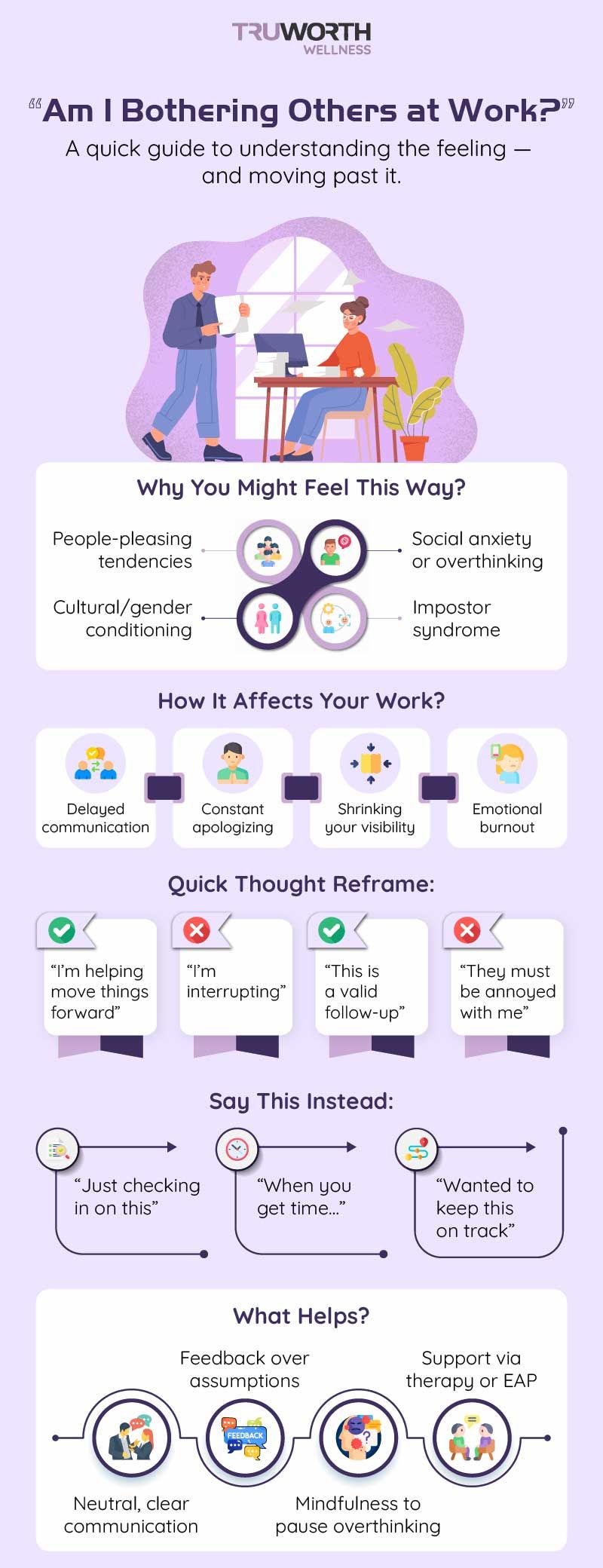How To Stop Feeling Like You're Bothering Others At Work?

Ever find yourself thinking, “I hope I’m not annoying my teammates,” even though no one has said anything? Maybe you hesitate before asking for help, fear sending a follow-up message, or apologize for things that didn’t require one. These seemingly small habits point to something bigger — a mental pattern that can impact your confidence, communication, and even your job satisfaction.
Midway through 2024, when workplace mental well-being is finally being prioritized, these emotional reflexes need attention, not judgment. Let’s unpack the psychology behind why you think you might be bothering others at work, even when you're not, and what you can do to change that mindset.
Also Read: Benefits Of Practicing Assertive Communication

Why You Might Feel Like You’re Bothering Others?
1. People-Pleasing Tendencies
At the core of this feeling lies an excessive desire to be liked. You might put others’ comfort above your productivity, fearing rejection or criticism. This mindset often leads to over-apologizing, self-censorship, and avoidance of necessary communication.
Psychology Insight: People-pleasers often develop these tendencies due to early conditioning — growing up in environments where affirmation was linked to compliance or silence.
2. Social Anxiety & Overthinking
If you often replay interactions in your head or worry about how others perceive you, you may be dealing with social anxiety. This fuels the fear that you’re being intrusive, even during normal workplace interactions.
Workplace Example: Feeling hesitant to send a reminder email, thinking it will annoy your manager, even though it’s a legitimate follow-up.
3. Impostor Syndrome
You may feel like you haven’t earned your place, so every interaction feels like you're adding weight to the “burden” others carry by tolerating you. This distorted thinking can lead to unnecessary guilt or avoidance behaviors.
Real-world Trigger: Avoiding meetings or not speaking up with ideas because you assume others already have it covered (and better).
4. Cultural or Gender-Based Conditioning
Many cultures and social frameworks teach individuals — especially women — to be agreeable, non-disruptive, and self-effacing. This conditioning can manifest in the workplace as a chronic fear of “taking up space.”
Example: Apologizing before sharing an idea or feeling anxious about walking into a meeting room that’s already occupied.
How It Affects Your Work Life?
- Reduced visibility in meetings and projects
- Delayed communication (which can frustrate others more)
- Burnout from emotional suppression
- Lower job satisfaction and self-esteem
Misunderstood intentions — others might read your hesitation as disinterest
What Can You Do About It?
1. Reality Check Your Thoughts
When you feel like you're bothering someone, pause and ask:
- Did they express irritation, or am I assuming it?
- Would I be bothered if someone did this to me?
This quick check can separate emotional noise from reality.
2. Practice “Neutral Assertiveness”
You don’t have to be loud or dominant to take up space — just clear. For example:
- “Just following up to keep this on track.”
- “Wanted to bring this to your attention as a priority.”
Neutral language helps reduce the emotional load while maintaining professionalism.
3. Stop Apologizing for Existing
Replace phrases like:
- “Sorry to bother you.” → “Just checking in on this.”
- “I know you’re busy, but…” → “When you get a moment, could you take a look?”
This doesn’t just change how others perceive you — it retrains you to feel worthy of space and communication.
4. Reframe Interruptions as Contributions
Every message, request, or idea you share is not a disturbance — it's a form of participation. Instead of thinking “I’m adding to their workload,” reframe it as “I’m helping move this forward.”
5. Use Mindfulness to Stay Present
Mindfulness practices at work can help you detach from overthinking spirals. Try this:
- Name what you're feeling (e.g., “I’m feeling nervous about this email.”)
- Breathe deeply for 5 seconds
- Send the email without over-editing or waiting hours
Repeat until the nervous system learns: It's okay to communicate freely.
6. Seek Feedback, Not Reassurance
Instead of saying “I hope I didn’t bother you,” try:
- “Is this a good time to connect?”
- “Would it be helpful if I update you weekly?”
Feedback promotes healthy boundaries and reduces guesswork, making both parties feel heard.
7. Talk to Someone (EAP or Therapist)
If these thoughts are frequent and impacting your mental well-being, a counselor or Employee Assistance Program (EAP) professional can help untangle the deeper patterns. They can guide you in shifting from insecurity to secure communication.
At Truworth Wellness, mental wellness is not just a checkbox. We provide access to expert counseling, assessments for social anxiety and workplace stress, and mindfulness tools tailored to corporate professionals.
Conclusion
Worrying about bothering others at work isn’t a flaw — it’s a signal. It shows that you care, but that care needs to be balanced. The goal is not to become brash or indifferent, but to stop shrinking yourself in fear of being seen.
You belong in your workplace — your questions, contributions, and communication are part of the value you bring. With awareness and small mindset shifts, you can replace fear with clarity and guilt with confidence.